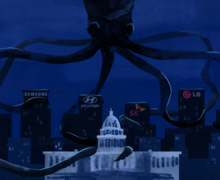‘Brooklyn Nine-Nine’ covers police brutality in bittersweet series finale
Nabeeha Anwar | Illustration Editor
Screentime columnist Sam Rivo explores the ups and downs of the final season of “Brooklyn Nine-Nine.”
Get the latest Syracuse news delivered right to your inbox.
Subscribe to our newsletter here.
There comes a point in every long-running television program when it becomes obvious that it is time to call it a day. That moment came for the eight-year sitcom “Brooklyn Nine-Nine,” which aired its series finale Thursday after a weird and complicated final season.
Between seasons seven and eight, the world’s attention shifted to policing in the United States. With the murder of George Floyd and the worldwide protests that followed, the cast and crew of “Brooklyn Nine-Nine” found themselves in an impossible place. The show, however, had previously touched on the themes of racial profiling and stop-and-frisk, most notably in a season four episode in which another officer stops and harasses Sergeant Terry Jeffords (Terry Crews) just outside his home while he was not in uniform. “Brooklyn Nine-Nine” knew it couldn’t continue its final season without addressing the elephant in the room. The “Brooklyn Nine-Nine” writers room rewrote the entire last season to address police brutality and police reform in a more holistic way.
“Brooklyn Nine-Nine’s” final season starts with Detective Rosa Diaz (Stephanie Beatriz) leaving the force because of the realization that she can’t ignore the consistent instances of police brutality against people who look like her. She becomes a private investigator, specializing in cases of police brutality among people of color. Although Rosa still appears in every episode, there is still a cloud over her as she is now distanced from the NYPD in the show.
The season eight opener, “The Good Ones,” highlights this strain in Rosa’s relationship with Detective Jake Peralta (Andy Samberg). Jake, through his sheer optimism towards his profession and lack of understanding toward her reasoning to leave the precinct, shows that even a police officer who thinks of themself as one of the “good ones” is still unable to truly grasp the harsh reality of a system that protects officers from the consequences of their actions.
A lesser show would have just shoehorned the themes of police brutality and police reform in the opening episodes. But “Brooklyn Nine-Nine” carefully developed these themes across its final season arc, though not always perfectly. At times, the show’s balancing of its complicated themes through both comedic and dramatic undertones felt clunky and awkward. There were moments where I felt awkward as a viewer listening to random half-decent jokes thrown into the more emotional scenes about police reform.
The final season’s central theme follows the main call of last summer’s protest: dismantling a system that favors protecting officers from their actions. The writers accomplish this by introducing Frank O’Sullivan (John C. McGinley), head of the NYPD patrolman’s union. O’Sullivan as a character has only one goal: to defend and protect officers from facing repercussions for their actions. The character has no depth or redeeming qualities, which made him too big of a caricature to be taken seriously. The show’s creators may have done this on purpose, to make fun of how some political figureheads have sounded when talking about policing in the United States.
The series finale doesn’t disappoint and ends the show on a high note with one last heist episode. The heist episodes have been a staple since season one, and the show uses the medium to bring back familiar characters and references that made viewers remember that the show isn’t just a comedy about cops, but a show about a family that happens to take place in a precinct. The finale was the best episode since the show’s move to NBC following its five seasons on FOX. Andre Braugher’s performance as the stoic and sometimes emotional Captain Raymond Holt continued to deliver.
Though the writers were put in a near-impossible situation in this final season, the entire last season felt like watching the carcass of a once-great television sitcom. When “Brooklyn Nine-Nine” premiered back in 2013, it was applauded for being ahead of its time with a racially diverse cast, intelligent humor and its ability to shatter stereotypes in how it portrayed the LGBTQ community.
Eight years have passed, however, and “Brooklyn Nine-Nine’s” presence in television is different from when it first aired. Be that as it may, the show’s cult following should keep it from being forgotten in time. It’s OK, though, to say the show has run its course and that “Brooklyn Nine-Nine” was ready to say goodbye.
Published on September 21, 2021 at 11:15 pm






